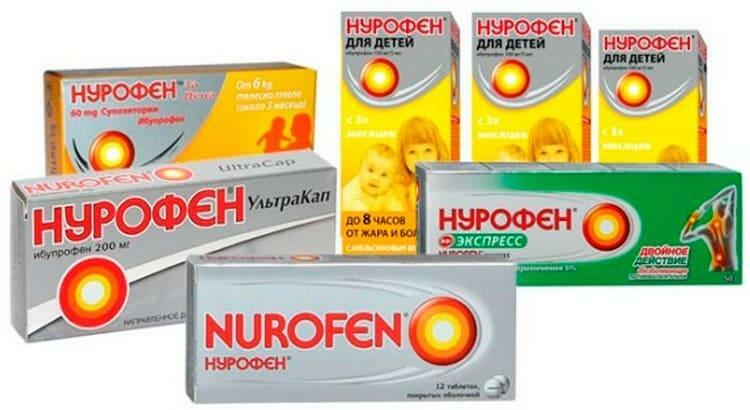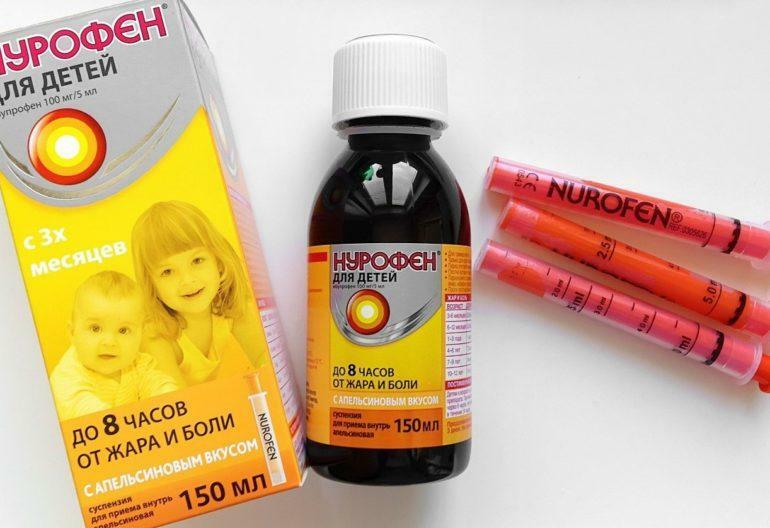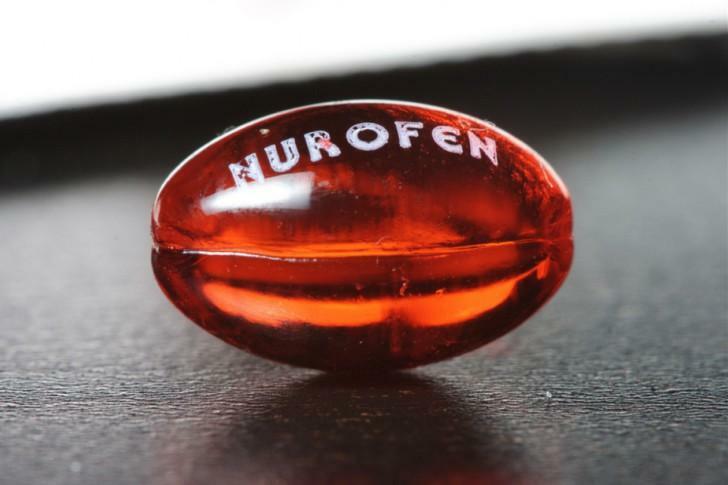Content
- How safe is Nurofen during pregnancy
- Nurofen's use in the 1st trimester
- Nurofen in the second trimester
- Nurofen in the third trimester
- Possible side effects of Nurofen in pregnant women
- What drugs can be taken by pregnant women
- Nurofen gel during pregnancy
- Nurofen ointment during pregnancy
- Prescribing Nurofen syrup for pregnant women
- Nurofen tablets: to take or not
- Can Nurofen Express
- What if a pregnant woman takes Nurofen for children?
- What is better for the expectant mother Nurofen or Paracetamol?
- Important from the instructions for Nurofen
- Group
- Dosage forms
- pharmachologic effect
- Indications for use Nurofen Express gel 5% 100g
- Contraindications
- Side effects
- Storage
- Nurofen during lactation
- When Nurofen is excreted
- What happens if you drink Nurofen without fever
How safe is Nurofen during pregnancy
In general, we note that the drug Nurofen has little studied possible negative consequences on the developing the fetus, in connection with which it is recommended to take it with great care and exclusively for the intended purpose doctor. But on the network you will find reviews of patients who took this drug for a short period of time and did not find any negative consequences.

Nurofen's use in the 1st trimester
Early pregnancy is one of the most important periods, it is at this time that all the systems and organs of the baby are laid. Therefore, doctors recommend trying to avoid taking any medications during the first trimester of pregnancy, select and administer topical treatments, if possible, and take the lowest dose of the safest drug.
Thus, at high temperatures, it is necessary to drink more liquid, do rubdowns with water at room temperature and wet compresses. In case of pain in muscles and joints, choosing between an anesthetic for oral administration or a local remedy, it is better to choose an anesthetic drug for external use, for example, Nurofen® Express gel12. However, it is also used with caution in the first and second trimesters of pregnancy12.
The use of the Nurofen® line of drugs in the first trimester is possible on the recommendation of a doctor.
Nurofen in the second trimester
During this period, the minimum doses of the drug are permissible, since the formation of the vital organs of the fetus is behind. However, the effect of the active substance on the child has not been fully understood, so the doctor always assesses the potential benefits and risks before prescribing a medicine.
Nurofen in the third trimester
In the last stages, your body is actively preparing for childbirth, it is very important during this period not to interfere with it, but to help the process in every possible way. Many of the drugs are prohibited at this stage, including Nurofen during late pregnancy can provoke the following negative consequences:
- not overgrowing of the duct between the ventricles of the heart in a baby;
- overburdening;
- complications during childbirth.
Of course, heart failure is treated after birth, but it is better not to allow it at all. And prolongation and complications in childbirth can cause unpredictable damage to the baby. You are unlikely to agree to this.
Possible side effects of Nurofen in pregnant women
Nurofen's instruction during pregnancy is a guide to using the product. According to the instructions, this drug is an antipyretic and analgesic anti-inflammatory agent. Nurofen has several forms of release, which makes its reception as convenient and effective as possible.
But is it possible to take the drug during pregnancy, will it help bring down the temperature or soothe the pain? As already mentioned, this drug is not advisable to take during pregnancy, so let's consider the possible side effects. Many doctors say that an adverse reaction to the drug is possible only in the case of prolonged reception, but during pregnancy due to hormonal changes, the risk of side effects increases.
- Nausea, vomiting, abdominal pain.
- Cystitis, nephritis.
- Shortness of breath, bronchospasm.
- Swelling, allergic skin reactions.
- Increased blood pressure.
- Thrombocytopenia and bleeding.
What drugs can be taken by pregnant women
- Paracetamol. WHO has recognized that this drug is the safest drug in pregnancy. It has no long-term side effects. At the same time, paracetamol is also an effective dental pain reliever during pregnancy, which has a persistent effect;
- Nurofen. It can be taken up to the 30th week;
- Papaverine. The remedy effectively eliminates pain by relieving spasms;
- No-shpa. It is a safe and effective antispasmodic that relieves pain of various origins.
- Ibuprofen. The remedy effectively fights pain.
The use of any of the listed drugs should be agreed with your doctor.
Nurofen gel during pregnancy
Nurofen gel is a product that is applied to the skin, so its effect is minimal on a child. Thus, we can safely say that Nurofen gel during pregnancy is the most preferred form of release. However, the drug must be prescribed only by a doctor. If you have to use gel, apply no more than 8 cm of the substance to the skin. This is the daily dose. It is necessary to rub the gel completely into the skin.
For this type of drug, a list of adverse reactions from the expectant mother is highlighted:
- reddened skin;
- burning;
- allergic reactions accompanied by spasms in the bronchi.
Nurofen gel cannot be used during pregnancy if a woman has:
- there is an increased sensitivity to the active substance;
- diagnosed with bronchial asthma;
- a history of gastrointestinal diseases;
- redness, erosion, skin rash are present.
Important! Use the gel with caution during breastfeeding.
Nurofen ointment during pregnancy
Nurofen in the form of an ointment during pregnancy is used to relieve back pain, inflammatory processes. It is also considered to be a relatively safe form of medication. The reason is the same as in the case of the gel - the active substance does not enter the bloodstream, therefore it does not harm the baby. The minimum dose effectively relieves pain, but does not harm the patient.
It is important that Nurofen is prescribed to pregnant women by a qualified specialist who is clearly aware of its dosages, contraindications and side effects. It is better to refuse taking Nurofen ointment in early pregnancy.
Prescribing Nurofen syrup for pregnant women
Nurofen syrup during pregnancy is an anti-inflammatory nonsteroidal drug. The syrup is available in bottles and sachets with a dosage of 100 and 5 ml. For ease of use, each Nurofen package is supplied with a syringe or measuring spoon.
Nurofen syrup is prescribed for influenza, hyperthermia, bacterial diseases and to eliminate pain syndromes, with inflammation of the ENT organs, with toothache and headache. During pregnancy, Nurofen syrup is taken with extreme caution. In the early stages, it is not advisable to take the drug, this also applies to the last trimester. In any case, the use of the drug must be approved by a doctor, who, after diagnosing the disease, will select an individual dosage.
Nurofen tablets: to take or not
Nurofen tablets during pregnancy, like any antibiotics, are not recommended. But, nevertheless, pills are used to treat headaches, back pain, toothache, neuralgia, SARS and fever. After taking the drug, the active ingredient, ibuprofen, is absorbed in the gastrointestinal tract. The drug binds to plasma proteins by 90%, and gradually penetrates into the joint cavity, concentrating in the plasma.

Nurofen is metabolized in the liver and excreted unchanged in the urine and bile. Nurofen tablets are prohibited from taking in early pregnancy and in the last trimester. Any use of Nurofen should be monitored by a doctor, and if side effects appear, the drug must be discarded.
Can Nurofen Express
Nurofen express is prescribed to relieve severe pain, lower temperature, relieve inflammation. The peculiarity of this drug is that it is produced in a convenient format, and of course, it acts faster and more efficiently. Nurofen express during pregnancy is not recommended in the first and third trimester of pregnancy. If a toothache occurs in the second trimester, a single prescription is warranted.
What if a pregnant woman takes Nurofen for children?
Pregnant women prefer Nurofen for children for pain, believing that since it is intended for children, then a negative effect is excluded. This is not true. Children's Nurofen differs from an adult only in the dose, which is calculated based on the patient's weight. If a pregnant woman takes a child's dose, the remedy simply will not have the desired effect, and by taking a dose appropriate for an adult, a woman risks the health of her unborn child. Consult your doctor about the appropriateness of Nurofen treatment.

What is better for the expectant mother Nurofen or Paracetamol?
Paracetamol begins to act more slowly, which is why the patient has to endure pain longer. It is also worse and for a shorter period of time reduces body temperature in viral and infectious diseases.
Paracetamol does not have the anti-inflammatory properties of Nurofen. But it is safer for pregnant women.
Moreover, during treatment with Ibuprofen, side reactions occur more often, there is a possibility of bleeding. It cannot be used for a long time, as the risk of damage to the mucous membranes of the stomach increases.
Important from the instructions for Nurofen
Antipyretic and pain relievers during pregnancy should be not only effective, but primarily safe for mom and baby. Before taking the medicine, study its instructions thoroughly.
Group
Anti-inflammatory drugs - derivatives of propionic acid
Dosage forms
| gel 5% 50g |
| capsules 200mg |
| tablets 200mg |
| gel 5% 150g |
| gel 5% 100g |
pharmachologic effect
Pharmacodynamics. The mechanism of action of ibuprofen, a propionic acid derivative from the group of non-steroidal anti-inflammatory drugs (NSAIDs), due to inhibition of the synthesis of prostaglandins - mediators of pain, inflammation and hyperthermic reactions. Indiscriminately blocks cyclooxygenase-1 (COX-1) and cyclooxygenase-2 (COX-2), as a result of which it inhibits the synthesis of prostaglandins. Has a fast directed action against pain (analgesic), antipyretic and anti-inflammatory action. In addition, ibuprofen reversibly inhibits platelet aggregation. Pharmacokinetics. Absorption - high, quickly and almost completely absorbed from the gastrointestinal tract (GIT). After taking the drug on an empty stomach, ibuprofen is found in the blood plasma after 10 minutes, the maximum concentration (Cmax) of ibuprofen in the blood plasma achieved after 30-40 minutes, which is twice as fast as after taking an equivalent dose of Nurofen®, in the dosage form of tablets, coated shell 200 mg. Taking the drug with food may increase the time to reach maximum concentration (TCmax). The connection with blood plasma proteins is more than 90%, the half-life (T1 / 2) is 2 hours. It slowly penetrates into the joint cavity, retains in the synovial fluid, creating higher concentrations in it than in the blood plasma. After absorption, about 60% of the pharmacologically inactive R-form is slowly transformed into the active S-form. It is metabolized in the liver. It is excreted by the kidneys (not more than 1% unchanged) and, to a lesser extent, with bile. In the elderly, there were no significant differences in the pharmacokinetic profile of the drug compared with younger people. In limited studies, ibuprofen has been found in breast milk at very low concentrations.
Indications for use Nurofen Express gel 5% 100g
As a local anesthetic and anti-inflammatory agent for conditions such as muscle pain, back pain, arthritis, pain with ligament injuries and sprains, sports injuries and neuralgia.
Contraindications
Contraindications to the use of Nurofen are as follows:
- complete / incomplete combination of bronchial asthma, recurrent polyposis of the nose and paranasal sinuses and intolerance to Aspirin or other NSAIDs;
- allergy to Nurofen;
- erosion / ulcer of the gastrointestinal tract, bleeding of ulcerative genesis;
- a history of perforation and bleeding of a gastrointestinal ulcer caused by the use of any non-steroidal anti-inflammatory drug;
- severe hepatic / renal impairment;
- acute liver disease;
- hyperkalemia;
- severe disorders in the work of the cardiovascular system (fourth grade according to NYHA);
- recovery after coronary artery bypass surgery;
- bleeding of any genesis;
- decompensated heart failure;
- hemorrhagic diathesis;
- third trimester of pregnancy;
- individual intolerance to fructose, sucrase-isomaltase deficiency, glucose-galactose malabsorption;
- hemophilia, blood clotting disorder.
Patients with a history of gastritis, colitis, enterocolitis, bronchial asthma, allergies, lupus erythematosus, Sharp's syndrome should be especially careful when treating Nurofen. Also, under the supervision of a physician, patients with severe dehydration, nephrotic syndrome should be treated.
Side effects
To avoid the manifestation of unwanted side reactions, it is necessary to take the medicine in small doses in a short course. In elderly people, the likelihood of complications provoked by taking Nurofen is higher.

When using the product, side reactions may occur:
- Disturbances in the work of the hematopoietic system, including agranulocytosis, thrombocytopenia, pancytopenia. With these diagnoses, first, the patient's body temperature rises, his throat begins to hurt. Later, mild epistaxis occurs. Numerous cutaneous hemorrhages appear.
- Allergic and anaphylactic reaction, airway spasm. Shortness of breath, bronchospasm, exacerbation of bronchial asthma are possible. Also, individual intolerance to Nurofen is manifested by urticaria, Lyell's syndrome, Stevens-Johnson syndrome, erythema, rhinitis, edema.
- Abdominal pain, nausea, vomiting, flatulence, constipation. Rarely, gastrointestinal bleeding, melena, gastritis, exacerbation of colitis, or Crohn's disease occur.
- Liver malfunctions. Increased activity of hepatic transaminases, jaundice, hepatitis.
- Acute renal failure - with prolonged use. Nephrotic syndrome, cystitis, hematuria, proteinuria, papillary necrosis.
- Headache. Aseptic meningitis.
- Blood pressure surges. Heart failure. The risk of blood clots may increase.
- Shortness of breath, shortness of breath.
Due to the use of Nurofen, changes in laboratory parameters may be observed. So, the level of hemoglobin and hematocrit, glucose concentration may decrease, blood clotting may decrease.
Plasma concentration of creatinine, on the contrary, increases, as does the activity of hepatic transaminases.
If the patient has any side effects, he needs to interrupt the anti-inflammatory drug course and re-seek medical advice. The doctor will conduct the necessary examination and select the optimal analogue of Nurofen.
Storage
At a temperature not exceeding 25 ° C. Keep the drug out of the reach of children.
Nurofen during lactation
There is confirmation that Nurofen penetrates into breast milk, but in extremely low concentrations, based on this the use of Nurofen during breastfeeding is expected to be acceptable and not adversely affect baby.
Despite the fact that Nurofen is the first drug of choice for pain relief in nursing mothers, spontaneous its use is not recommended because when taken in higher doses, it is not known how Nurofen might affect child. Therefore, the doctor should determine the specific dosage and duration of use.
The developmental and health benefits of breastfeeding should also be considered, along with the mother's clinical need for it. the drug and any potential side effects of this drug or an underlying mother's condition for breastfeeding child.
When Nurofen is excreted
Quickly absorbed, ibuprofen penetrates not only into the plasma, but also concentrates in the joint cavity, as well as in the cerebrospinal fluid. The half-life is two hours. Ibuprofen is completely excreted from the body after 4-5 hours through the kidneys with urine.
What happens if you drink Nurofen without fever
The antipyretic effect of Nurofen is due to the influence of ibuprofen on thermoregulation in the brain. The drug is not intended to lower the temperature by a certain number of divisions. Its action is based on stopping the inflammatory process, which provokes an increase in temperature. This means that taking Nurofen with a thermometer reading at 36.6˚C will not reduce the values to 35˚C or 34˚C, but will leave them unchanged.
Sources of
- https://uroki4mam.ru/nurofen-pri-beremennosti
- https://www.nurofen.ru/poleznye-sovety-po-oblegcheniyu-zhara-i-boli/bol-i-zhar-u-vzroslyh/nurofen-pri-beremennosti-mozhno-li-pit-beremennym-kak-prinimat-nurofen-po-trimestram/
- https://ilive.com.ua/family/nurofen-pri-beremennosti_112565i15828.html
- https://premium-clinic.ru/vredny-li-obezbolivayuschie-pri-beremennosti/
- https://www.aptekaonline.ru/p/nurofen/instruction/
- https://aptekamos.ru/tovary/lekarstva/ibuprofen-333/nurofen-ekspress-kapsuly-200mg-67092/instrukciya
- https://aptekamos.ru/tovary/lekarstva/ibuprofen-333/nurofen-ekspress-gel-5-100g-76113/instrukciya
- https://medum.ru/nurofen-ehkspress-gel
- https://www.apteka24.ua/pregnancy/nurofen/
- https://aptstore.ru/articles/nurofen-ot-kakoy-boli-spasaet-i-kak-bystro-sbivaet-temperaturu/
